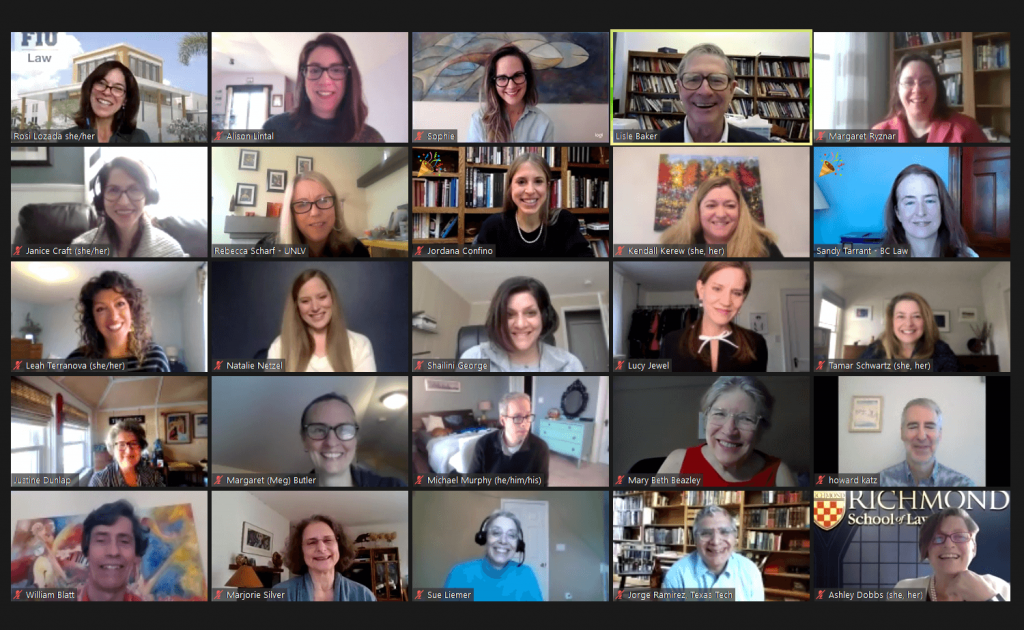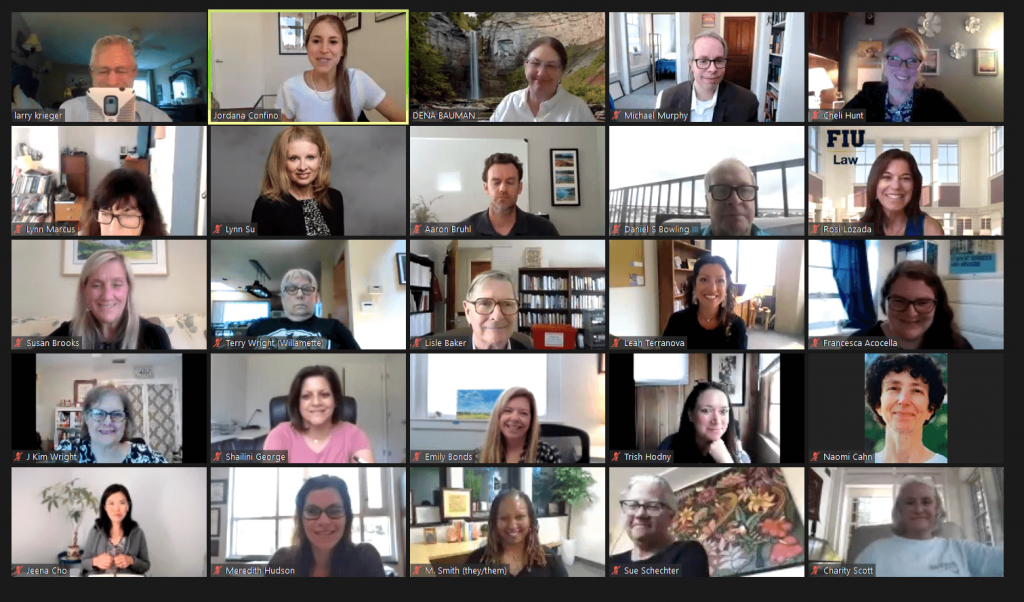Date Chartered: 5/22/2007
Purpose
The Section on Balance & Well-Being in Legal Education seeks to investigate, discover, and inspire those practices that support the well-being of law students, lawyers, and judges. The Section encourages research into the conditions that allow students and practitioners to thrive, both personally and professionally, and informs the membership of the Association of American Law Schools about the results of that research. Among other things, Section activities explore the importance of health, compassion, integrity, and ethics to the effective study and practice of law. The Section promotes continual re-examination of pedagogical practices, program content, and institutional priorities to promote the long-term best interests of law students and the constituencies they will serve.
Annual Meeting Programs
2025
- Balance & Well-Being in Legal Education Main Program, (Co-Sponsored by Clinical Legal Education and Legal Writing, Reasoning, and Research)
- Balance & Well-Being in Legal Education Works-in-Progress Program
- Scholarship, Co-Sponsored by Balance & Well-Being in Legal Education
2024
- Main Program
- Minority Groups (Co-Sponsored by Balance & Well-Being in Legal Education)
- Balance & Well-Being in Legal Education
- Institutional Advancement (Co-Sponsored by Balance & Well-Being Legal Education, Dean, For the Law School, and Student Services)
2023
- Main Program
- Award Ceremony
- Teaching Methods (Co-Sponsored by Academic Support, Balance & Well-Being in Legal Education, and Minority)
- Teaching Methods (Co-Sponsored by Academic Support and Balance & Well-Being in Legal Education and New Law Professors)
- Women in Legal Education (Co-Sponsored by Balance in Legal Education)
2022
- Main Program
- Networking Session
- Section on For the Law School Dean and Pro-Bono Services and Public Service Opportunities Joint Program (Co-Sponsored by Balance in Legal Education)
2021
- Main Program
- Pedagogy
- Teaching Methods (Co-Sponsored by Balance in Legal Education)
- Section on Student Services and Part-Time Division Programs Joint Program (Co-Sponsored by Balance in Legal Education)
- Panel 1
- Panel 2
- Panel 3
- Panel 4
- Business Meeting
- Networking Session
2020
Awards
Section of the Year
Annual Award of the Section on Balance & Well-Being in Legal Education
This award is designed to honor an individual for outstanding contributions to the promotion of well-being in legal education. The awardee serves as a model of Balance & Well-being Section ideals, develops innovative programming that integrates this work into curricular or co-curricular offerings, contributes to academic scholarship in the field, and regularly serves the Section, their law school and greater legal community by providing access to well-being programming and/or services.
Recipients
| Year | Award Name | Recipient | Law School |
|---|---|---|---|
| 2025 | Annual Award of the Section on Balance & Well-Being in Legal Education | Rosario Lozada | Florida International University College of Law |
| 2024 | Annual Award of the Section on Balance & Well-Being in Legal Education | Marjorie Silver | Touro University Jacob D. Fuchsberg Law Center |
| 2023 | Annual Award of the Section on Balance & Well-Being in Legal Education | Heidi K. Brown | Brooklyn Law School |
| 2022 | Annual Award of the Section on Balance & Well-Being in Legal Education | Shailini George | Suffolk University Law School |
Compendiums
2021 Speed-Idea Sharing Series
- Laura Ferrari: The Suffolk Chill Zone Description – Featured on Series One
- Laura Ferrari: The Chill Zone Presentation – Featured on Series One
- Chad Noreuil: Two Minutes of Zen & Mindful Mondays – Featured on Series One
- Lisa Bliss: Semester-Long Exercise to Build Community in a Class – Featured on Series Two
- David Jaffe: Individual Outreach – Featured on Series Two
- Dena R. Bauman: Wellness Exercise – Featured on Series Three
- Susan Brooks: One Word Check-In and Check-Out – Featured on Series Three
- Cheli Hunt: Strengths-Based Bar Plan – Featured on Series Three
- Lawrence Krieger: A Welcome Exercise – Featured on Series Three
- Michael Murphy: Being Genuine – Featured on Series Three
- Michael Murphy: Speed of Fun – Featured on Series Three
- Jordana Confino: Peer Mentoring & Leadership Course – Featured on Series Four
- Leanne Fuith: Foundations of Practice – Featured on Series Four
- Dr. Susan Landrum: Guide to Creating SMART Academic Goals – Featured on Series Four
- Charity Scott: Reflective Lawyer Course – Featured on Series Four
- Charity Scott: Syllabus and Course Policies for the Reflective Lawyer Course – Featured on Series Four
- Nicky Boothe-Perry: Mindful Minute – Featured on Series Five
- Danielle Kocal: Incorporating Well-Being into Any Class – Featured on Series Five
- Susan Liemer: Embodied Legal Education – Featured on Series Five
- Seema Patel: The Mindful Minute – Featured on Series Five
- Seema Patel: The Mindful Minute PowerPoint – Featured on Series Five
- Christine Church: Anxiety Practice of Law Class – Featured on Series Six
- Nyla Miller: Student Stress Management Plan – Featured on Series Six
- Laurel Rigertas: Time Management Exercise Options – Featured on Series Six
- Rebecca Simon: Spontaneous Remission – Featured on Series Six
EC Statement
The AALS Section on Balance & Well-Being in Legal Education’s Executive Committee and Past Chairs are united in outrage by George Floyd’s murder on May 25, 2020, as well as the subsequent actions by the current administration and many federal, state, and local police officials.
George Floyd’s murder, along with the killings of Breonna Taylor, David McAtee, and countless other Black Americans by police—as well as the killings of those such as Ahmaud Arbery by citizens—are stark reminders of the systemic and structural racism connected to anti-Blackness that continues to plague our legal system and society.
We stand in solidarity with all those who are protesting racial injustice and police brutality.
As a Section, we are committed to studying the relationship between health, compassion, integrity, and ethics to the effective study and practice of law and to the elimination of systemic, structural, and cultural racial oppression.
In making this commitment, we recognize the generations of trauma that impact so many of us, our communities, and our society as a result of violence, discrimination, and oppression based upon the color of one’s skin.
In making this commitment, we also recognize the privilege many of us experience merely because we are not subject to that racial violence, discrimination, or oppression.
Finally, in making this commitment, we recognize that as members of the legal academy, we are responsible for educating future lawyers not only to fight injustice, but to turn inward and recognize the advantages they and we have. We recognize that as lawyers, our professional identities are tied to our social responsibilities to overall justice, to a functioning and content society, to a fair court system, and to ourselves. We recognize that “Equal Justice Under the Law” has to be more than just the inscription on the U.S. Supreme Court building, and that we must do our part to ensure that it is an ideal the nation and all of its institutions and officials live up to and that all of its citizens realize.
We offer our expertise to help those suffering from mental or emotional distress arising from the constructed inequality in our society. We recognize and accept our own social and professional advantages, and encourage others to engage in compassionate introspection of their own privilege as well as to have honest conversations about racial injustice.
Most critically, we offer compassion, understanding, and empathy to all, as we join everyone who continues to remind the world that Black Lives Matter.
In solidarity,
AALS Section on Balance and Well-Being in Legal Education Executive Committee
Shailini J. George, Chair
Michael Murphy, Chair-Elect
Laurel A. Rigertas
Alicia Virani
Ann M. Sinsheimer
Jenipher Jones
Lisle R. Baker
Daniel Canon
AALS Section on Balance & Well-Being in Legal Education Past Chairs
Jarrod Reich
Jennifer Brobst
Susan Brooks
Amy Bushaw
Kathy Hessler
Lawrence Krieger
Courtney Lee
Calvin Pang
Julie Sandine
Marjorie Silver
The foregoing is a statement of the Executive Committee and Past Chairs of the Balance & Well-Being in Legal Education Section of the Association of American Law Schools. It does not necessarily represent the position of the Association.
Newsletters
Past Section Officers
Scholarship Bibliography
Webinars & Webinar Recordings
Upcoming
Speed Share Series: Section on Balance & Well-Being in Legal Education Summer Speed Share Series | Association of American Law Schools
Past
2025 Speed Sharing Series
2025 14-Day Writing Challenge
2024 Speed Sharing Series
Comparative Well-Being and Professional Identity Formation in Legal Education: United Kingdom and United States
March 18, 2024
Section on Balance & Well-Being in Legal Education – 14-Day Writing Challenge Kickoff
September 8, 2023
Yoga: Aligning the Body to Quiet the Mind
October 21, 2020
This session was not recorded.
2023 Speed Sharing Series
2022 Speed Sharing Series
Session One: Second Annual Speed Sharing Presentation Series Kickoff
May 2
This session was not recorded.
2021 Speed Sharing Series
Session Three: Well-Being Teaching Strategies
June 24
This session was not recorded.
Gallery


